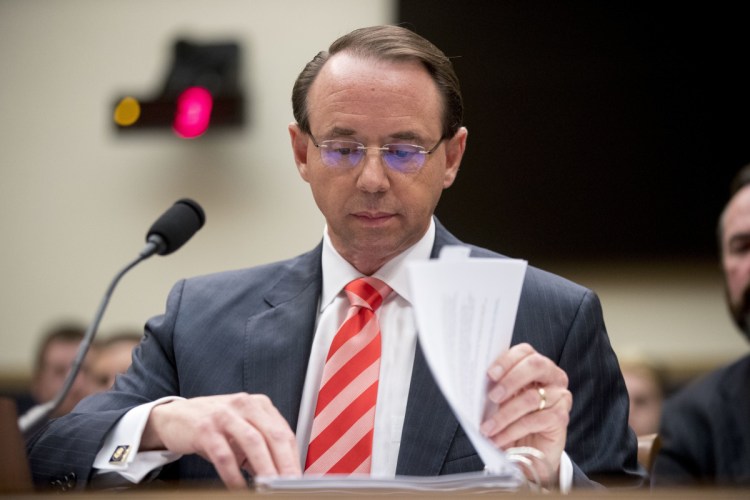WASHINGTON – Deputy Attorney General Rod Rosenstein has told people close to him that he expects to depart the Justice Department if a new attorney general is confirmed, though there are no concrete plans in place or timeline for him to do so, according to people familiar with the matter.
Rosenstein has been the No. 2 Justice Department official since April 2017, his tenure defined by his appointment of Robert Mueller to lead the investigation into Russian interference in the 2016 presidential election, and the attacks he incurred from President Donald Trump for doing so. Incensed by Mueller’s work, Trump periodically toyed with the idea of ousting his deputy attorney general, though Rosenstein managed to avoid the ax time after time.
Rosenstein’s departure – whenever it occurs – will likely spark fears about the future of the Mueller probe, though even now, Rosenstein is not technically in charge of it. Rosenstein appointed Mueller to probe whether the president’s campaign had coordinated with the Kremlin because then-Attorney General Jeff Sessions was recused from the matter. Special counsels, though, normally answer to the attorney general, so when Sessions was forced out in November, supervision fell to Matthew Whitaker, whom Trump chose to serve as acting attorney general.
Whitaker, who had been publicly critical of the Mueller probe, resisted recusal from the start, and Justice Department officials recently made it known that he had rejected the advice of ethics officials to step aside. That left him nominally in charge, though Rosenstein seemed to maintain his regular involvement in the probe, and Whitaker has not yet taken any steps that have become public to impede Mueller’s work as some feared he might.
A person familiar with the matter said Rosenstein is not being forced out now, but instead, that he always saw the deputy attorney general job as one that would likely last two years. The person said Rosenstein will likely stay on until after William Barr, a former attorney general whom Trump recently nominated to take the job again, takes office.
That assumes Barr is confirmed by the Senate. A hearing on Barr’s confirmation is scheduled for next week, and lawmakers could vote on the nomination in early February. Rosenstein has told people he would stay on board to ensure a “smooth transition,” a person familiar with the matter said.
The expectation that Rosenstein would depart was first reported by ABC.
In some ways, Rosenstein’s departure is unsurprising. Barr has told people he would like to select his own deputy attorney general – which is normal for the Justice Department’s top leaders. The deputy attorney general is like a chief operating officer, managing much of the department’s day-to-day and mediating disputes between its many sprawling parts. Attorneys general generally prefer a deputy with whom they can work well, and Barr has said publicly when he served as attorney general the last time – during the George H.W. Bush administration – he wanted to make the selection for the job.
“That was part of my deal, that I picked the deputy, but I’d put in somebody as associate they were satisfied with,” Barr said in a 2001 interview.
In the Trump administration, though, Rosenstein had taken on a unique importance because of his central role in the Russia investigation, and the fear among Democrats that removing him could lead to catastrophic consequences for Mueller.
Rosenstein’s job security has frequently been in doubt, as the president who appointed him frequently attacked him privately and publicly. Speculation that he could be fired or resign reached a fever pitch in September, following revelations that in May 2017, shortly after the firing of then-FBI Director James Comey, Rosenstein had suggested that senior law enforcement officials might secretly record the president.
That explosive suggestion – which Rosenstein’s defenders insist was never serious, but more of a sarcastic comment – came amid a series of tense conversations with then-acting FBI Director Andrew McCabe, according to people familiar with the discussions. Immediately after Comey was fired, the FBI had opened an obstruction of justice investigation into Trump. Tensions were high between McCabe and Rosenstein over Rosenstein’s support of Comey’s firing and how to proceed with the politically explosive task of investigating the president, these people said. At one point, the two had an angry confrontation in which each argued that the other should be recused from the Trump investigation, these people said.
After the New York Times reported on Rosenstein’s suggestion of secretly recording the president, it seemed Rosenstein would be ousted. The news outlet Axios reported that he had “verbally resigned,” though that would turn out not to be true. Instead, Rosenstein talked with Trump and stayed in his job – the president apparently having been mollified by whatever Rosenstein told him.
White House press secretary Sarah Sanders said Tuesday that Rosenstein “had always planned to stay around two years,” and that he would like to help with the new attorney general’s transition.
“He’s done a great job,” she said.
Send questions/comments to the editors.



Comments are no longer available on this story